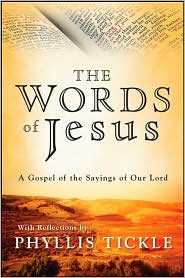
from Phyllis Tickle's The Words of Jesus: A Gospel of the Sayings of Our Lord:
"I just had never thought about Jesus being human at that level, of His being so subject to the same kind of innate human instincts and qualities that the rest of us are. Of course He presents and conducts Himself differently in different situations. Why ever wouldn't He? Once was the time I would have regarded such a discovery as close to irreverent and a threat to His godness. Now I embrace it with a kind of fond gratitude. It was, you must understand, the first place in the course of this work that He demanded I let Him out of my preconceptions."
I doubt that Ms. Tickle, a senior fellow of the Cathedral College of Washington National Cathedral, would consider herself a literal reader of the Bible. Yet she treats these 'Sayings' (yes, beginning with a captial 'S' as well as a capital 'H' whenever speaking of Jesus in the third person) as though they are historical fact. If Jesus is so human, aren't also those who supposedly wrote down what he said, incidentally, the first to do so approximately 40 years after he died? I don't really know if we can say beyond a shadow of a doubt that the historical person, Jesus of Nazareth, actually said any of these sayings. What we can say is that these sayings are attributed to him, which speaks to what his followers believed about him as much as who he really was.
What is important to me is that we have these sayings, these stories, public and private teachings, exhortations and laments, of a time and place and a person when it seemed that history and very human lives turned in another direction. For me, faith needs to include a healthy amount of skepticism, otherwise we might sound as adulatory as Anne Rice in Christ the Lord: Out of Egypt, an imaginative view of Jesus' unknown childhood.
I fell in love with Jesus myself when I was in high school. He was perfect in every way to me: a brother, a friend, a savior and healer of my deepest woes, the source of my joy. But in the best love affairs we mature and grow and so does our view of our beloved. It does not diminish the person but reveals the true self in all its beauty and imperfection.
It is not the sayings that are so important, or even who said them, but our response to them: how we integrate them in our lives and in our eternal beingness.

1 comment:
You have an encouraging way of humanizing God while eschewing the vain trappings of religion. I find it inspiring.
Post a Comment